#and also harry deciding NOT to kill heather is powerful too
Explore tagged Tumblr posts
Text
rambling about harry mason (apologies for any grammar errors)
harry mason is such a fascinating protagonist in context of silent hill protagonists. he’s not fucked up (travis) or mentally ill (murphy) or fucked up AND mentally ill (alex), or james sunderland (james sunderland). he’s just a guy who cares about his daughter because (i might be wrong on this tbh) she’s the only family he has and cheryls his little girl. he’s a good normal guy, who cares about other people, who’s willing to go the distance for his daughter.
the only time he really fucks up in sh1 is with lisa during her breakdown. but like, can you blame the guy? the only person that you’ve been able to trust (next to cibyl, arguably) is essentially dying infront of you, becoming some sort of monster, begging for you to save her and you just can’t. his only option was to run at that point, or just. die, i guess?
he’s unique among the sh protagonists (except... henry, i think. and maybe alex too?) because silent hill isnt molded around his psyche, its molded around his daughter’s. and maybe im looking to deeply in a low poly ps1 model, but he visibly isnt scared of some of the shit happening. maybe because he’s in autopilot looking for cheryl or maybe its because he has to be a strong, fearless dad for his daughter who isnt afraid of anything. (something cheryl needs and something alessa definitely desparetely wanted in a parental figure).
and maybe he is scared shitless but i dont know that kind of makes him more. likeable? despite his fear he’s still going to find his baby girl, because despite how scared he is, she’s probably 10x more scared than he is.
i dont know what else to say guys. i just like harry. he’s a cool dude.
#Yosu's thoughts#silent hill#harry mason#i also just. like how cheryl is adopted and harry still cares *so* much#that may sound weird but in a lot of media theres a lot of adopted parents dont care stuff#harry loves cheryl so much despite everything. and he loves heather too despite heather basically killing cheryl#(also you can argue harry contemplating killing baby heather is fucked up. which it is.)#BUT imagine being in his position. imagine you have a daughter and then she's killed by god#and then god brings her back as a completely different person#is this baby a fucked demon baby? you dont know#and also harry deciding NOT to kill heather is powerful too#he goes on to love heather like he did cheryl#harry is such a cool dad#we love you harry#(also this is also [mostly] the same about shattered memories harry but like. that game makes me sad to talk about)
35 notes
·
View notes
Text
The Rampant Toxic Masculinity in The Society (and do the perfect male characters exist?)
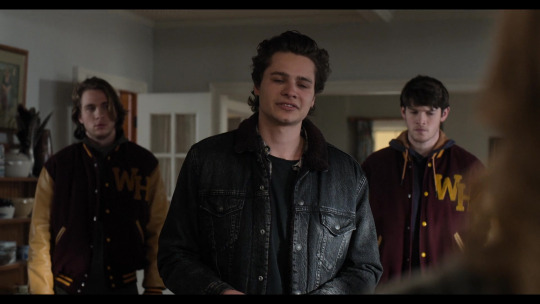
The Society was one of the most talked about series on Netflix before it got abruptly cancelled in 2020 due to COVID concerns. But one of the downer parts of the series was that how the female characters were shown to be complex while most of the male characters were shown to be two-dimensional if not, really really horrible. So let’s take a look at how each of the male characters were portrayed (except for Grizz, Sam, Gordie and Will because they subverted the toxic masculinity in the series so I am counting them out).
Campbell Eliot:
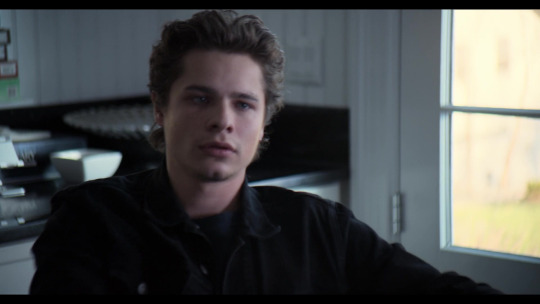
Campbell Eliot is first introduced as a typical bad boy character who doesn’t want to follow the rules (Think J.D. from Heathers). Though we see a lot of red flags about him in the first episode, like when we see him try to shoot Cassandra and kick his deaf brother Sam out of his house, calling him a really offensive name. And then he ends up having Elle all to himself. But later in the episode 4, Sam exposes him to be a psychopath with no remorse at all while Campbell drowns Elle, but Allie thinks it’s bullcrap and decides to free him. It proves to be a mistake at the end (which we will come to later). Campbell basically represents every abuser in real life and deconstructs the bad boy archetype we’ve seen in the media. Whatever he does isn’t romanticised for entertainment and it shows he is the ankle-biting, menopause-aching and cockroach-crawling worst.
Harry Bingham:
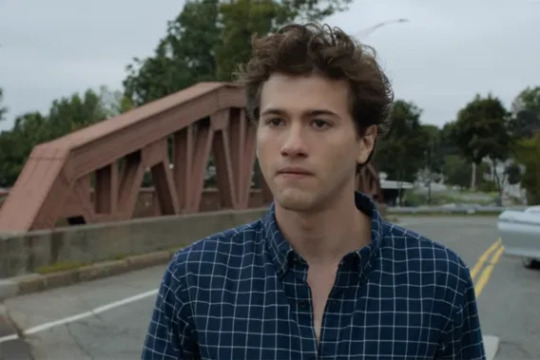
Harry is introduced as a popular rich kid, but all of that gets changed after he and others get shifted to New Ham. He is jealous of Cassandra and doesn’t agree with her methods at all and wishes that someone would shut her up. Unfortunately his wishes come true when Greg Dewey, a rampant psycho kills Cassandra, which drives Harry into guilt and eventually causes him to suffer from depression and isolate himself from others. Campbell takes advantage of this and uses Harry as his puppet for his reign of terror.
The Guard (Especially Clark and Jason):
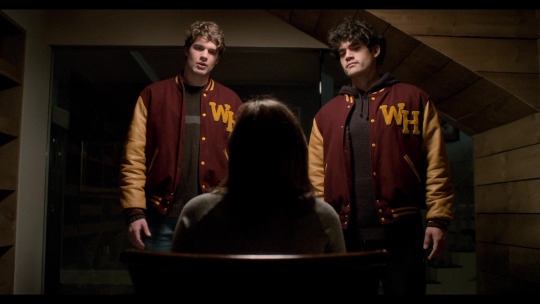
Clark and Jason start off as typical dumb jocks in the series. They seem to want to play football and nothing else. Then when they end up in New Ham, they end up forming a police force known as the Guard (how there were no female jocks that could’ve been part of the guard, I’ll never understand.) At first they try to do the right thing and follow the rules of the Mayor (Cassandra and then Allie), but slowly and slowly they end up getting drunk with power and start abusing their prisoners. This even gets worse when Allie rejects their idea of joining the election to become the mayor and they join Campbell’s coup just out of spite against her. What is so realistic is that they even represent the police brutality that is rampant in some countries.
How these men ruined the ending?
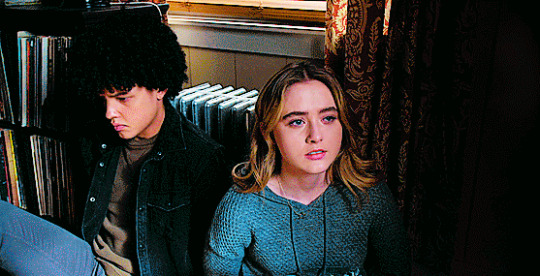
What makes the ending worse is the fact that Allie, a woman leader and Will, a young black man were imprisoned by a psychopathic tyrant, a spoilt rich white kid and a group of angry young white men acting as the police. What makes this ending so controversial is the fact that this is taking place at the same time as the Me Too movement where the powerful people like Campbell are being exposed for their abuse against women and police brutality (like The Guard’s in New Ham) is getting exposed and protested against by everyone. And since the series got cancelled, we might never get a redemption to this controversial cliffhanger filled with abusive men taking power away from a female protagonist.
Breaking Stereotypes of Masculinity

While The Society failed most of it’s male characters, these days there are more nuanced portrayals of a lot of male characters on TV who have broken stereotypes of what men should be.
Elliot Alderson in Mr. Robot is the most popular example. He is a non-stereotypical male character who embodies all kinds of tropes that is usually applied to strong female characters such as the Broken Bird, The Independent Woman and the Gorgeous but Vengeful Female Vigilante who preys on abusive men such as perverts, cheaters, rapists, pedophiles etc. He is shown to be really sensitive and emotional but it doesn’t make him weak. He is even put through so much physical, emotional and mental trauma throughout the series, but he shows time and time again that he is strong and he is a true survivor. He even says that it’s his love and care for others that drives him to save the world.
Marty Deeks from NCIS: Los Angeles depicts the “Manic Pixie Dream Boy”, the role that is usually applied to female characters who try to lift a brooding male character from their despair. But the trope is gender flipped between Kensi and Deeks. Like every MPDG, Deeks also has the quirkiness, free spiritedness and vivaciousness and bursts into Kensi’s life when he first meets her. When he first meets Kensi, he makes it his goal to lift her from her brooding and jaded world and make her happy. And unlike the other MPDGs, he is even shown to have his own story. He also has his own struggles and flaws and is shown to battle with them from time to time, but still stays positive through all of it.
Din Djarin from The Mandalorian starts off as a tough bounty hunter, but after meeting Grogu, the jedi child, he becomes more soft and responsible with him and makes it his point to be protective of him. He isn’t afraid to show his feelings from time to time and to soften up a bit.
Jesse Pinkman from Breaking Bad is first seen as a manly small time gangster who teaches Walter White to roughen up. But as the series progresses, he is shown to be more sensitive and has more morals while Walter progresses down a very sociopathic path. His strength and weakness is that he cares a lot for a lot of people and loves a lot, which is what makes him human.
#the society#analysis#series analysis#miscellenous#mr robot#mr. robot#ncis: los angeles#breaking bad#the mandalorian#toxic masculinity
10 notes
·
View notes
Text
Silent Hill – 1983
Without the other half of her soul, Alessa could not birth God, so Dahlia casts a spell that would attract the baby back to Silent Hill when she grew older.
Four years later Jodie dies of a disease making Harry a single parent. Harry still grieving from Jodie's death, a now seven-year-old Cheryl begs him to take a relaxing vacation to the resort town of Silent Hill, and he gives in.
Due to car troubles, they arrive late at the outskirts of Silent Hill, Harry sees a girl (an astral projection) walking across the street in front of the car Harry having to swerve to avoid hitting her is knocked unconscious by the resulting car crash.
Upon waking it’s discovered Cheryl has disappeared and he is forced to venture into the snowing, fog-covered town to rescue her. At first glance Old Silent Hill, seems to be abandoned. In the distance he sees Cheryl running away, and he immediately hurries to follow her. Chasing her through the streets of Silent Hill, he finds himself running down a small residential road and into a dark alley.
The sky suddenly turns dark, a siren blares in the distance, and when Harry lights the area with a lighter, he finds that his entire environment has altered into the Otherworld. Everything is covered in rust and blood, topped with barbed wire, and the shapes of hanging bodies are discernible behind the mesh. The sounds of industrial clanking and grinding metal form a constant cacophony of ambient noise. With nowhere to go, Harry follows the alley and finds the disturbing body of a mutilated corpse hanging on a fence before him. Moments later, he is attacked by small, child-like monsters known as the ‘Grey Child’ Harry is eventually overwhelmed and ‘killed’.
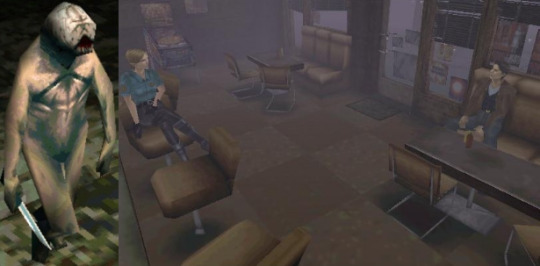
He wakes up in a diner called Cafe 5to2. An officer Cybil Bennett from the nearby town Brahms questions him about the current state of the town and she provides him with a handgun before leaving to look for help. In the diner, Harry arms himself with a map, a knife, and a flashlight. As Harry attempts to leave the diner, a radio on a nearby table starts emitting static, causing Harry to investigate it. A flying creature crashes through a window and into the store attacking him killing the monster he starts to move through the streets encountering others, he quickly discovers the radio's usefulness when it emits intensifying static as monsters grow closer. Following a clue left by his daughter, Harry eventually finds his way to Midwich Elementary School to search for her.
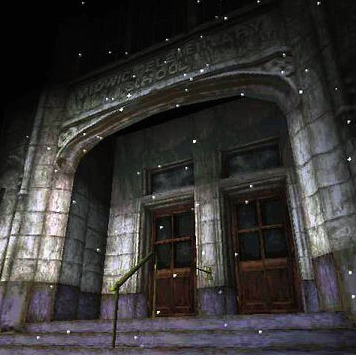
Instead of students and teachers, Harry finds many Grey Children or Mumblers.
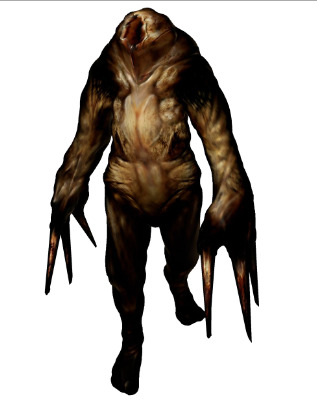
He works his way around, eventually unlocking the clock tower in the school's courtyard. Upon reaching the other side of the facility across from it, he finds the world has once again shifted into the Otherworld. In the Otherworld school, Harry travels to the boiler room. Inside a flaming corpse illuminates a creature known as Split Head.
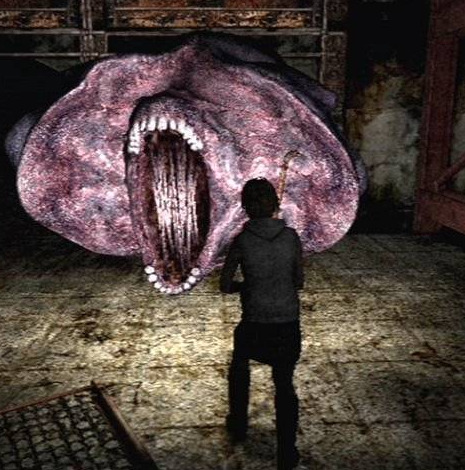
With its defeat, everything turns to darkness, and then the light returns reveal an ordinary boiler room. A girl, Alessa Gillespie, is leaning against the boiler, and she turns to Harry before disappearing into thin air.

Confused, Harry departs from the school. He hears a church bell ringing in the distance and heads to the Balkan Church, where he sees a woman praying at an altar.

In a confusing conversation she reveals herself to be Dahlia Gillespie. She gives Harry a mystical item called the Flauros and tells him to make haste to the hospital. Before Harry can ask any questions, Dahlia leaves, and Harry exits the church. He crosses a bridge that leads to Central Silent Hill.
Harry arrives at Alchemilla Hospital, where he encounters Michael Kaufmann, a doctor who is as bewildered as Harry about the current circumstances.
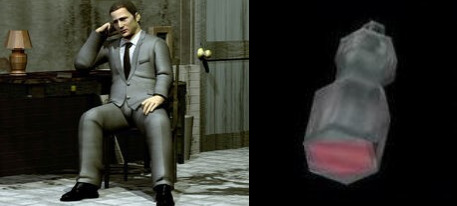
Shortly after this meeting, Harry obtains a red liquid known as Aglaophotis, which purpose is later revealed, drinking it. Harry endures another shift to the Otherworld the hospital now infested with monstrous nurses. Along the way, he also meets Lisa Garland (Yeap same nurse from Origins). Before he can get any answers, he is transported back to the real world, where Dahlia reappears and tells him that the "Mark of Samael” seen in various locations, must not be completed, lest "the darkness" devour the whole town.

Meeting up with Cybil, who has seen a girl out on the lake, the pair find a hidden altar in an antique store, Harry disappears out of sight, much to her confusion. Harry, meanwhile, finds himself back in the hospital with Lisa, who gives him directions to the lake, but also tells Harry she feels she's "not supposed to leave". On the way to the lake, Harry passes through some sewers and enters the Resort Area.
Here you determine Kaufmann's fate (and the game's ending) by choosing to assist him in Annie's Bar and doing a side-quest. Canon-wise, Harry saves Kaufmann and fulfills the side-quest. Kaufmann is thankful, but his business presses him onward. Harry finds a motorcycle stash of a mysterious red vial in a gas tank, Kaufmann reappears and angrily snatches it away.
Soon after the Otherworld begins to take over the town again. Regrouping with Cybil and deciding to stop the mark's completion at Dahlia's desperate request, Harry heads to the lighthouse, while Cybil's goal is reaching Lakeside Amusement Park. As an unknown assailant attacks Cybil, Harry once more sees Alessa and the "Mark of Samael" at the top of the lighthouse before heading to the amusement park himself.

On the amusement park's carousel, Cybil appears, possessed by a parasite. The player may choose to save or kill Cybil, once again affecting the game's ending; if Harry wishes to save Cybil, he must use the red liquid he obtained at the hospital on her, Cybil is killed by Harry in the regular Good and Bad endings. With Alessa appearing once more, Harry unwittingly uses the Flauros to trap her. Dahlia appears, revealing that she manipulated him into confining her, as he was the only one who would be able to get close to her, and that Alessa is in fact her daughter.
With Alessa's powers out of control, Harry awakens to find himself back in the distorted Otherworld hospital. He finds Lisa bleeding from every orifice in front of him, Harry flees when she approaches him. Lisa's diary, left in the room, explains that she was the nurse who attended to Alessa in return for a drug she was addicted to, PTV.
PTV is a drug made of a plant that grew only in Silent Hill, the ‘White Claudia’, in order to create hallucinations and mysterious visions popularly used by The Order and tourists.
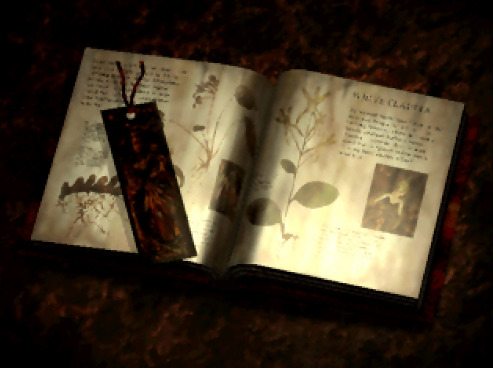
(Fun Fact! The white flowers may be a reference to Morning Glory, that is also found in the same areas near water as the White Claudia, they’re a family of flowering plants with hallucinogenic seeds that were used in Native American religious ceremonies.)
Dr. Michael Kaufmann, the manager of Alchemilla Hospital at Central Silent Hill, is the one responsible for the illegal distribution this drug. Harry then witnesses a flashback of a meeting between Dahlia, Kaufmann, and two cult doctors discussing Alessa's hospitalization and the rebirth of God.
Harry soon finds Dahlia and possibly Cybil if he saved her previously (Cybil's survival may or may not be canonical), as well as a figure in a wheelchair wrapped in bandages: who is Cheryl and Alessa recombined and Alessa's astral projection.
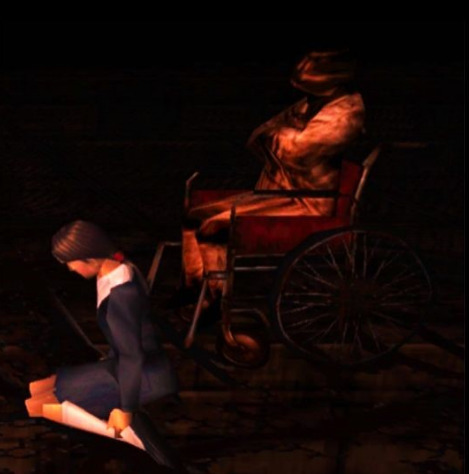
Both a flashback and Dahlia's words explain that Dahlia sacrificed her daughter to fire seven years ago in an attempt to nurture and bring about the birth of God worshiped by the Order, of which Dahlia is a priestess, and that the God now resides within Alessa's womb. AS mentioned at the beginning Alessa split her soul in half to prevent God from being born. The other half of the soul manifested itself as Cheryl, who as said before was found as a baby on the road outside of Silent Hill.
In the present, when Cheryl was called back to Silent Hill, Alessa began inscribing several Seals of Metatron around the town to purge Silent Hill of reality, killing herself to prevent God's birth. Alessa manifested herself as an astral projection in the town to place the marks Harry has seen in an attempt to keep the God at bay. Dahlia also reveals that the "Mark of Samael" is the Seal of Metatron and she used Harry as her pawn. With Alessa's plan defeated and the two halves of her soul now back together instead of birthing God Alessa births something twisted by the world views of the person (Dahlia) in charge of the ceremony known as the Incubus.
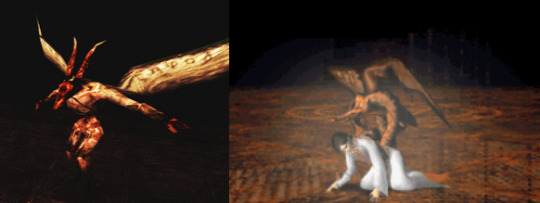
In the most endings, Kaufmann appears and throws a vial of Aglaophotis at the god, Aglaophotis as it turns out is obtained from the refinement of an herb of the same name and has the ability to dispel demonic forces and grant supernatural protection against such forces to those who use the item. So, when hit with the substance, the Incubator falls to the ground, screaming as the Incubus emerges from her back. The Incubus kills Dahlia, Harry then fights and defeats the god, and the Incubator gives him a baby (who is revealed to be Heather Mason in Silent Hill 3) and shows him the escape route. Harry, Cybil, and Kaufmann try to escape, but a blood-covered Lisa Garland appears and drags Kaufmann with her into the abyss. Harry and Cybil continue their escape, but the Otherworld is collapsing too quickly for them to make it on their own, so the Incubator (Alessa) uses the last of her power to stop the world's destruction in order for them to escape she is then consumed by the flames, and Cybil and Harry escape together with the baby.
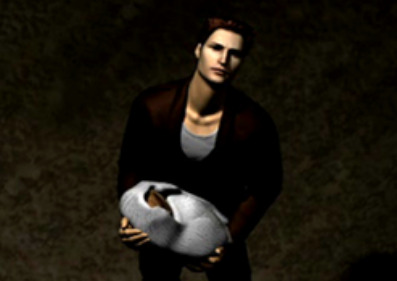
4 notes
·
View notes
Text
December 30, 2020
Heather Cox Richardson
Dec 31
And so, we are at the end of a year that has brought a presidential impeachment trial, a deadly pandemic that has killed more than 338,000 of us, a huge social movement for racial justice, a presidential election, and a president who has refused to accept the results of that election and is now trying to split his own political party.
It’s been quite a year.
But I had a chance to talk with history podcaster Bob Crawford of the Avett Brothers yesterday, and he asked a more interesting question. He pointed out that we are now twenty years into this century, and asked what I thought were the key changes of those twenty years. I chewed on this question for awhile and also asked readers what they thought. Pulling everything together, here is where I’ve come out.
In America, the twenty years since 2000 have seen the end game of the Reagan Revolution, begun in 1980.
In that era, political leaders on the right turned against the principles that had guided the country since the 1930s, when Democratic President Franklin Delano Roosevelt guided the nation out of the Great Depression by using the government to stabilize the economy. During the Depression and World War Two, Americans of all parties had come to believe the government had a role to play in regulating the economy, providing a basic social safety net and promoting infrastructure.
But reactionary businessmen hated regulations and the taxes that leveled the playing field between employers and workers. They called for a return to the pro-business government of the 1920s, but got no traction until the 1954 Brown v. Board of Education decision, when the Supreme Court, under the former Republican governor of California, Earl Warren, unanimously declared racial segregation unconstitutional. That decision, and others that promoted civil rights, enabled opponents of the New Deal government to attract supporters by insisting that the country’s postwar government was simply redistributing tax dollars from hardworking white men to people of color.
That argument echoed the political language of the Reconstruction years, when white southerners insisted that federal efforts to enable formerly enslaved men to participate in the economy on terms equal to white men were simply a redistribution of wealth, because the agents and policies required to achieve equality would cost tax dollars and, after the Civil War, most people with property were white. This, they insisted, was “socialism.”
To oppose the socialism they insisted was taking over the East, opponents of black rights looked to the American West. They called themselves Movement Conservatives, and they celebrated the cowboy who, in their inaccurate vision, was a hardworking white man who wanted nothing of the government but to be left alone to work out his own future. In this myth, the cowboys lived in a male-dominated world, where women were either wives and mothers or sexual playthings, and people of color were savage or subordinate.
With his cowboy hat and western ranch, Reagan deliberately tapped into this mythology, as well as the racism and sexism in it, when he promised to slash taxes and regulations to free individuals from a grasping government. He promised that cutting taxes and regulations would expand the economy. As wealthy people—the “supply side” of the economy-- regained control of their capital, they would invest in their businesses and provide more jobs. Everyone would make more money.
From the start, though, his economic system didn’t work. Money moved upward, dramatically, and voters began to think the cutting was going too far. To keep control of the government, Movement Conservatives at the end of the twentieth century ramped up their celebration of the individualist white American man, insisting that America was sliding into socialism even as they cut more and more domestic programs, insisting that the people of color and women who wanted the government to address inequities in the country simply wanted “free stuff.” They courted social conservatives and evangelicals, promising to stop the “secularization” they saw as a partner to communism.
After the end of the Fairness Doctrine in 1987, talk radio spread the message that Black and Brown Americans and “feminazis” were trying to usher in socialism. In 1996, that narrative got a television channel that personified the idea of the strong man with subordinate women. The Fox News Channel told a story that reinforced the Movement Conservative narrative daily until it took over the Republican Party entirely.
The idea that people of color and women were trying to undermine society was enough of a rationale to justify keeping them from the vote, especially after Democrats passed the Motor Voter law in 1993, making it easier for poor people to register to vote. In 1997, Florida began the process of purging voter rolls of Black voters.
And so, 2000 came.
In that year, the presidential election came down to the electoral votes in Florida. Democratic candidate Al Gore won the popular vote by more than 540,000 votes over Republican candidate George W. Bush, but Florida would decide the election. During the required recount, Republican political operatives led by Roger Stone descended on the election canvassers in Miami-Dade County to stop the process. It worked, and the Supreme Court upheld the end of the recount. Bush won Florida by 537 votes and, thanks to its electoral votes, became president. Voter suppression was a success, and Republicans would use it, and after 2010, gerrymandering, to keep control of the government even as they lost popular support.
Bush had promised to unite the country, but his installation in the White House gave new power to the ideology of the Movement Conservative leaders of the Reagan Revolution. He inherited a budget surplus from his predecessor Democrat Bill Clinton, but immediately set out to get rid of it by cutting taxes. A balanced budget meant money for regulation and social programs, so it had to go. From his term onward, Republicans would continue to cut taxes even as budgets operated in the red, the debt climbed, and money moved upward.
The themes of Republican dominance and tax cuts were the backdrop of the terrorist attack of September 11, 2001. That attack gave the country’s leaders a sense of mission after the end of the Cold War and, after launching a war in Afghanistan to stop al-Qaeda, they set out to export democracy to Iraq. This had been a goal for Republican leaders since the Clinton administration, in the belief that the United States needed to spread capitalism and democracy in its role as a world leader. The wars in Afghanistan and Iraq strengthened the president and the federal government, creating the powerful Department of Homeland Security, for example, and leading Bush to assert the power of the presidency to interpret laws through signing statements.
The association of the Republican Party with patriotism enabled Republicans in this era to call for increased spending for the military and continued tax cuts, while attacking Democratic calls for domestic programs as wasteful. Increasingly, Republican media personalities derided those who called for such programs as dangerous, or anti-American.
But while Republicans increasingly looked inward to their party as the only real Americans and asserted power internationally, changes in technology were making the world larger. The Internet put the world at our fingertips and enabled researchers to decode the human genome, revolutionizing medical science. Smartphones both made communication easy. Online gaming created communities and empathy. And as many Americans were increasingly embracing rap music and tattoos and LGBTQ rights, as well as recognizing increasing inequality, books were pointing to the dangers of the power concentrating at the top of societies. In 1997, J.K. Rowling began her exploration of the rise of authoritarianism in her wildly popular Harry Potter books, but her series was only the most famous of a number of books in which young people conquered a dystopia created by adults.
In Bush’s second term, his ideology created a perfect storm. His administration's disastrous response to Hurricane Katrina, which killed more than 1,800 people and caused $125 billion in damage in and around New Orleans in 2005, revealed how badly the new economy had treated Black and Brown people, and how badly the destruction of domestic programs had affected our ability to respond to disasters. Computers permitted the overuse of credit default swaps that precipitated the 2008 crash, which then precipitated the housing crisis, as people who had bet on the individualist American dream lost their homes. Meanwhile, the ongoing wars, plagued with financial and moral scandals, made it clear that the Republicans optimistic vision of spreading democracy through military conflict was unrealistic.
In 2008, voters put Black American Barack Obama, a Democrat, into the White House. To Republicans, primed by now to believe that Democrats and Black people were socialists, this was an undermining of the nation itself, and they set out to hamper him. While many Americans saw Obama as the symbol of a new, fairer government with America embracing a multilateral world, reactionaries built a backlash based in racism and sexism. They vocally opposed a federal government they insisted was pushing socialism on hardworking white men, and insisted that America must show its strength by exerting its power unilaterally in the world. Increasingly, the Internet and cell phones enabled people to have their news cater to their worldview, moving Republicans into a world characterized by what a Republican spokesperson would later call "alternative facts."
And so, in 2016, we faced a clash between a relentlessly changing nation and the individualist ideology of the Movement Conservatives who had taken over the Republican Party. By then, that ideology had become openly radical extremism in the hands of Donald Trump, who referred to immigrants as criminals, boasted of sexually assaulting women, and promised to destroy the New Deal government once and for all.
In the 2016 election, the themes of the past 36 years came together. Embracing Movement Conservative individualist ideology taken to an extreme, Trump was eager enough to make sure a Democrat didn't win that, according to American intelligence services, he was willing to accept the help of Russian operatives. They, in turn, influenced the election through the manipulation of new social media, amplified by what had become by then a Republican echo chamber in which Democrats were dangerous socialists and the Democratic candidate, former Secretary of State Hillary Clinton, was a criminal. Thanks to the Supreme Court’s Citizens United decision which permitted corporate money to flow into election campaigns, Trump also had the help of a wave of money from big business; financial institutions spent $2 billion to influence the election. He also had the support of evangelicals, who believed he would finally give them the anti-abortion laws they wanted.
Trump lost the popular vote by almost 3 million votes but, as George W. Bush before him, won in the Electoral College. Once in office, this president set out to destroy the New Deal state, as Movement Conservatives had called for, returning the country to the control of a small group of elite businessmen who, theoretically, would know how to move the country forward best by leveraging private sector networks and innovation. He also set out to put minorities and women back into subordinate positions, recreating a leadership structure that was almost entirely white and male.
As Trump tried to destroy an activist government once and for all, Americans woke up to how close we have come to turning our democracy over to a small group of oligarchs.
In the past four years, the Women’s March on Washington and the MeToo Movement has enabled women to articulate their demand for equality. The travel ban, child separation policy for Latin American refugees, and Trump’s attacks on Muslims, Latin American immigrants, and Chinese immigrants, has sparked a defense of America’s history of immigration. The Black Lives Matter Movement, begun in July 2013 after George Zimmerman was acquitted of murdering teenager Trayvon Martin, has gained power as Black Americans have been murdered at the hands of law enforcement officers and white vigilantes, and as Black Americans have borne witness to those murders with cellphone videos.
The increasing voice of democracy clashed most dramatically with Trump’s ideology in summer 2020 when, with the support of his Attorney General William Barr, Trump used the law enforcement officers of the Executive Branch to attack peaceful protesters in Washington, D.C. and in Portland, Oregon. In June, on the heels of the assault on the protesters at Lafayette Square, military officers from all branches made it clear that they would not support any effort to use them against civilians. They reiterated that they would support the Constitution. The refusal of the military to support a further extension of Trump's power was no small thing.
And now, here we are. Trump lost the 2020 election to Democrat Joe Biden by more than 7 million votes and by an Electoral College split of 306 to 232. Although the result was not close, Trump refuses to acknowledge the loss and is doing all he can to hamper Biden’s assumption of office. Many members of the Republican Party are joining him in his attempt to overturn the election, taking the final, logical step of Movement Conservatism: denying the legitimacy of anyone who does not share their ideology. This is unprecedented. It is a profound attack on our democracy. But it will not succeed.
And in this moment, we have, disastrously, discovered the final answer to whether or not it is a good idea to destroy the activist government that has protected us since 1933. In their zeal for reducing government, the Trump team undercut our ability to respond to a pandemic, and tried to deal with the deadly coronavirus through private enterprise or by ignoring it and calling for people to go back to work in service to the economy, willing to accept huge numbers of dead. They have carried individualism to an extreme, insisting that simple public health measures designed to save lives infringe on their liberty.
The result has been what is on track to be the greatest catastrophe in American history, with more than 338,000 of us dead and the disease continuing to spread like wildfire. It is for this that the Trump administration will be remembered, but it is more than that. It is a fitting end to the attempt to destroy our government of the people, by the people, and for the people.
7 notes
·
View notes
Photo

* * * *
LETTERS FROM AN AMERICAN
January 19, 2021
Heather Cox Richardson
On January 20, 2017, Trump took the oath of office and gave his “American Carnage” speech describing America as a hellscape, and we were off to the races.
Trump vowed he would smash norms and boundaries to “drain the swamp.” He filled positions in his administration with political operatives and appointed his son-in-law Jared Kushner to manage so many projects it would have been funny if it weren’t so deadly serious. The policies the administration advanced were usually hastily and poorly conceived; when the courts overturned them, Trump complained of “the Deep State.”
Days after he took office, he issued the travel ban aimed at Muslims, the first in a series of actions throughout his presidency designed to subordinate people of color to white Americans. The racism in his rhetoric and regulations pulled white supremacists behind him. On August 11-12, 2017, they rioted in Charlottesville, Virginia. Their protest of the removal of a statue of Confederate General Robert E. Lee became an attempt to create a political vanguard.
The “Unite the Right” rally turned violent, injuring more than 30 people and killing 32-year-old Heather Heyer, whose last Facebook post before she joined the counter protest in Charlottesville read: “If you’re not outraged, you’re not paying attention.” Three days after the riots, asked about the violent protests in Charlottesville, Trump said that “you… had people that were very fine people, on both sides.” People took that, rightly, as Trump’s support for white supremacy and the gangs that advanced it, a support illustrated dramatically in summer 2020, when he and his attorney general, William Barr, used federal troops against peaceful Black Lives Matter protesters.
By spring 2017, there was another crisis on the horizon. The FBI was investigating the cooperation of Trump’s presidential campaign with Russian spies. Trump’s former National Security Adviser, retired lieutenant general Michael Flynn, had lied to the FBI about conversations with then-Russian Ambassador Sergey Kislyak, and Trump pressured then-FBI Director James Comey to stop the agency’s investigation of Flynn. When Comey refused, Trump fired him, prompting the deputy Attorney General Rod Rosenstein to appoint Special Counsel Robert Mueller (then-Attorney General Jeff Sessions had recused himself because he, too, had lied about conversations with Russians) to investigate the ties between Trump campaign officials and Russian operatives.
Both Mueller’s report and the report of the Republican-led Senate Intelligence Committee established that Russian operatives had interfered in the 2016 election to help Trump. They indicated that Trump campaign officials knew what the Russians were doing and were willing to accept their help. The Senate Intelligence Committee also noted that Trump’s campaign chair Paul Manafort gave sensitive internal information about the campaign to a Russian operative in Ukraine. Trump continued to call these allegations the “Russia hoax,” but observers noted that, for all his feuds with other leaders, he seemed oddly solicitous of Russian President Vladimir Putin.
Trump came to office with an expanding economy. In the first three years of his presidency, the economy continued to grow, in part because of tax cuts that slashed the corporate tax rate by 40%. Trump promised that these cuts would be “rocket fuel for our economy,” but economic growth stayed at about 2.9%, the same as it had been in 2015, and more than 60% of the benefits from the cuts went to those at the top 20% of the economic ladder. Even before the pandemic, Trump’s economic policies were projected to add about $10 trillion to the national debt by 2025, an increase of more than 50%.
And then the pandemic hit. Trump first downplayed the crisis, then insisted that Democrats demanding he address the crisis were overplaying it: he called it a Democratic “hoax.” The pandemic tanked the economy, undercutting his best argument for reelection, and by summer 2020 the administration had decided its best option was to reopen schools and the economy and to try to achieve herd immunity through infections. The result was a disaster. Today, on the last day of Trump’s administration, the number of Americans we have officially lost to Covid-19 has topped 400,000. That’s about the same number of people we lost in World War Two.
The pandemic threw about 22 million people out of work and forcing businesses into bankruptcy. As the faltering economy undercut Trump’s plans for reelection, he tried to destroy faith in mail-in ballots, trying to drive people to in-person voting sites. Then, when that didn’t work, he pushed the idea that Democrats would steal the election. Although his Democratic challengers Joe Biden and Kamala Harris won the 2020 election by more than 7 million popular votes and secured the Electoral College by a vote of 306 to 232, Trump and his supporters continued to insist the election was stolen.
On January 6, 2021, Trump and key members of his administration rallied his supporters to attack the counting of the certified electoral ballots for Biden and Harris. Encouraged by the president, the crowd marched to the Capitol with the plan of disrupting the vote. They overpowered the police, killing one officer; broke into the building; and came within a minute of taking our elected leaders hostage, or perhaps executing them on the gallows they built.
In the wake of the attack on the Capitol, the House of Representatives impeached Trump for the second time—the first was in 2019 after he withheld congressionally-approved money to Ukraine in an attempt to bully the newly-elected Ukraine president into announcing an investigation into Joe Biden’s son Hunter in the hopes of weakening Biden as a potential rival in the 2020 election.
So, Trump leaves the White House tomorrow facing a second Senate impeachment trial.
Trump has split the Republican Party. His true loyalists intend to turn America into a right-wing, white, Christian nation as embodied in the 1776 Report the administration released yesterday. In the last days of the administration, Trump’s Secretary of State Mike Pompeo is pretty clearly trying to position himself for a 2024 presidential run, tweeting from the official government account of the State Department a long list of what he considers his accomplishments. Others are likely planning to give him a run for his money. Today Senator Josh Hawley, under suspicion of inciting the January 6 rioters with his support for throwing out Biden’s Electoral College votes, slow-walked Biden’s nominee for Secretary of Homeland Security because Hawley objects to Biden’s plans to create a path to citizenship for undocumented immigrants.
Establishment Republicans are trying to regain control of the party. After the January coup attempt, some corporations announced they would no longer donate to Republicans who had voted to challenge the certified electoral votes, while others declared a moratorium on all political spending. The corporate turn against the Trump wing of the Republican Party strengthened the backbone of the establishment Republicans. Today Senate Majority Leader Mitch McConnell (R-KY) stood on the floor of the Senate and put Trump at the center of the January 6 attack on the Capitol. "The mob was fed lies," McConnell said. “They were provoked by the President and other powerful people."
But McConnell went on. He claimed that neither party has a broad mandate after the 2020 elections, which, he said, meant that the Democrats have no call to advance “sweeping ideological change.” He is referring, of course, to the plans of incoming President-Elect Biden and Vice President-Elect Kamala Harris, which he has every intention of stopping.
Today, President-Elect Joe Biden arrived at Joint Base Andrews. He traveled in a private plane since Trump refused to extend him the traditional courtesy of a military plane offered from an outgoing president to an incoming one. Trump will not attend Biden’s swearing-in; he will leave for Florida in the morning. In his place, three of the other living ex-presidents will be attending the inauguration: Republican George W. Bush, Democrat Bill Clinton, and Democrat Barack Obama. It’s a party of ex-presidents, together to emphasize the peaceful transition of power. Trump won’t be there.
The tide is already turning against him. Vice President Mike Pence has announced he will not be able to attend Trump’s farewell ceremony as he is attending Biden’s inauguration instead. House Minority Leader Kevin McCarthy (R-CA) and McConnell—who will become minority leader tomorrow after the two new Democratic senators from Georgia are sworn in—are not going to see Trump off, either: they will be attending church with Biden before his inauguration.
Tomorrow at noon, President-Elect Joe Biden takes the oath of office. He intends to return the government to the principles the Democratic Party has held since the late nineteenth century: that the federal government has a role to play in responding to the needs of ordinary Americans. He has also embraced the traditional Democratic idea that the government should actually look like the people it represents. In an implicit rebuke of Trump’s white nationalism, he has tapped the most diverse set of officials in American history. They are also extraordinarily well-qualified and have many years of experience in government.
Biden and Harris have already outlined a very different administration than Trump’s. Their first task is to combat the coronavirus. Biden wants 100 million vaccinations in his first 100 days in office, and is mobilizing the Federal Emergency Management Agency (FEMA) and the National Guard to make that happen. To rebuild the economy, they have advanced a coronavirus relief package designed to protect children, first, and then women and families. It calls for expanded food relief and rent and mortgage protection, as well as expanded unemployment benefits and a one-time relief payment.
Trump’s administration is, perhaps, ending where it began. This weekend, Russian opposition leader Alexei Navalny returned to Russia after his near-fatal poisoning by Putin’s agents in August. Upon his return to Russia, authorities immediately detained him. Trump refused to join other nations in condemning the poisoning, but yesterday, Senator Mitt Romney (R-UT) demanded that the U.S. hold Putin accountable for “the corruption and lawlessness of the Putin regime.” Joining Romney in calling for new sanctions against Russia were a range of senators from both parties.
The act is called the “Holding Russia Accountable for Malign Activities Act.”
—-
LETTERS FROM AN AMERICAN
HEATHER COX RICHARDSON
#Quotes#political#corrupt GOP#criminal GOP#history#Letters From An American#Heather Cox Richardson#Lord of the Lies#authoritarianism#January 6 2021
4 notes
·
View notes
Text
Ok basic Silent Hill verse concepts I have in mind:
She’s the daughter of a high priest in the Order. No clue who her mother is; she vamped after Skarlet was born. Her father was one of the main people instrumental in the ritual that was performed on Alessa years ago, and he has obsessed over his near-success ever since. His obsession extended to Cheryl/Heather, and he believed that she would be the great savior of the world that brought forth the Order’s “god” in a fanatical manner that was not-so out of place in the cult. Skarlet, however, felt neglected and was utterly deprived of parental affection due to her father’s fixation on Alessa, Cheryl/Heather, and the latter’s prophesied return.
She never quite fit in with the Order and lacked true faith in their beliefs, and though she tried to hide it, her irreverence emerged often and got her into trouble, leading to her suffering a number of abuses over the years characteristic of the Order’s preferred “methods of instruction”.
By the time she reached young adulthood, Skarlet had grown desperate to end her outcast status and earn her father’s approval. She broke into his study to access his archives of occult knowledge and attempted to perform a ritual on herself to turn herself into a new savior for the Order in hope to supplant their need for Cheryl/Heather and refocus their veneration upon herself.
Though the ritual was successful, it did not have the desired effect, as she had in fact used the incorrect ritual due to her lack of understanding of what had happened to Alessa in the first place (whether because either she was not born yet, was too young to remember, or simply did not rank high enough in the order to know the truth about Alessa; I have not decided which circumstance yet because I haven’t decided when Skarlet should have been born and when she performed the ritual.)
She *did* bind one of the lesser deities of Silent Hill to herself (Xuchilbara, the Red God, who I do personally believe is “The Crimson One” mentioned in the Book of Crimson Ceremony) but not in the same manner as “God” was tied to Alessa and later Cheryl/Heather. While the ritual that tied “God” to Alessa/Cheryl/Heather was meant to lead to the entity’s birth into the real world, the ritual that tied Xuchilbara to Skarlet imprisoned the deity within her soul meaning that it could never be born and reunite with “God”, it’s master. Thus, Skarlet’s intentions to make herself a new savior for the Order led to her profaning their deities and undermining their ultimate goal. So this made things worse for her.
They could not kill her for this act of unintentional heresy as doing so would kill Xuchilbara, so instead they have forced her to serve instead in hope that her performing the duties of Xuchilbara will eventually lead to the deity growing in power enough to devour her soul and free itself. She is utterly despised and ostracized by the Order now whereas before she was just considered to be a troublemaker, and her own father will no longer talk to her. The only members of the Order that willingly deal with her without fear of being “tainted by the god-consuming she-devil” or something like that are the higher ranking priests who give her daily commands and “prayers”, as they call them.
They’re not entirely wrong about it, either. While it’s not happening as they imagine, i.e. Xuchilbara “devouring” her soul to free itself, her consciousness is gradually merging with that of the entity, as evidenced by her personality changing and her slowly gaining more access to the knowledge and power of Xuchilbara as time passes. Xuchilbara is not destroying her soul; she is becoming Xuchilbara.
Abilities are basically the same as in her canon. Blood magic, inter-realm teleportation, sway on mentality, etc. In terms of how this translates to Silent Hill, she can perform various rituals involving blood (the most extreme and rarest of these being the Crimson Ceremony which she has only performed once because of how badly it exacerbates her merging), she can shift between all the worlds of Silent Hill at will, and she can influence the various worlds somewhat depending on whose “world” she’s in (for example, she could probably influence what someone like James or Harry sees but not someone like Alessa or Walter because the latter examples shape their own worlds while the former are mostly bystanders in their own nightmares thus cannot fight back for control).
[body horror tw] Her physical form does not change much through the different worlds. Nothing changes in the real world regardless of whether or not she is tapping into Xuchilbara’s abilities; she appears as a normal human. In the fog world, only a small change occurs when she uses Xuchilbara’s abilities, and it is that her eyes change to red pupils with black sclera. But this does not always happen; it depends on how complex her usage is, and she can hide subtle influences easily. In the otherworld, her form is far more monstrous but not to an extreme degree as she is still recognizable. Her eyes change as mentioned, and her entire body below her shoulders becomes wrapped in black liquid tendrils with thick, faintly-glowing red “veins” twisted underneath and visible through gaps. Blood coats her arms and legs and pours from her eyes almost like tears, but the droplets that fall from her seem to never hit the ground.
[body horror tw] The psychological elements presented in her demonic form center around the imagery of a person being utterly engulfed by darkness and despair. Blood is on her hands; blood she never meant to spill. The blood is power to her, it represents the demonic strength of Xuchilbara, but it also represents Skarlet’s greatest mistake and the consequences she’s suffered because of it, thus the pouring tears. The tendrils are wrapped around her so tightly that you can make out her feminine form, and combined with the retention of her human face, this represents an illusion of beauty. A silhouette of what she had envisioned; the glory that she wanted to bring upon herself. Idealized, yet corrupted beyond intention, and despite holding a resemblance to herself, she is slowly becoming something unrecognizable to who she once was. Even more, the tendrils represent a loss of agency. She is constrained, every inch of her, and tied to a will that is not her own. The glowing red “veins” that show through the gaps in the black tendrils are a similarly ugly truth; no matter how she tries to change herself to earn approval, no matter how she presents herself, the truth of who and what she is will always make itself known eventually, and she can never escape the fate she has damned herself to. The blood that drips from her will never touch another person nor her surroundings, as her burden is for her alone and cannot be passed on to another. Her suffering is entirely her own. She cannot so much as touch someone with her own skin. She is isolated. She is all but strangled by the strings that puppeteer her. Xuchilbara may nor be destroying her, but Skarlet is being devoured nonetheless.
#horror tw#body horrow tw#psychological horror#[silent hill ; 001]#I'm sleepy forgive the grammar and spelling slips
4 notes
·
View notes
Text
Movies and TV shows of 2019
Okay so a couple or few years ago I did a review of movies that had released that year because I was super into movies that year. I am still into movies, but I have been watching a lot more shows this year. So, I will be reviewing movies and tv shows. Furthermore, I will be including stuff released this year, that I found this year, or that has a new season this year. Basically just anything that I have loved this year. Also, I don’t feel like ranking, so no particular order. Also, SPOILERS AHEAD - if you see a title of something you have not seen, and don’t want spoilers, please feel free to skip that section. Also, some of these I haven’t seen in a hot minute so if I get a detail messed up, we won’t speak on it. And finally, trigger warning - if you have struggled with sexual assault and may have an issue reading about it, either skip this post entirely or skip over the review of “Unbelievable.”
MOVIES -
1. After
I have been waiting for this since middle school. I read the after books on wattpad because what teenager in love with harry styles didn’t. Now I will be real with y'all. The acting could use some work in specific scenes, and some of the actors aren't MY favorite picks for certain roles, but I’m not gonna hate on actors. Ok so, Tessa (Josephine Langford) is an incoming freshman in college and is rooming with an upperclassmen, Steph (Khadijha Red Thunder) who has a friend named Hardin (Hero Fiennes-Tiffin). Steph wants Tessa to branch out and do new things, so she invites her to a party, where they play the stereotypical games, and thats when Hardin is kind of dared to make Tessa fall in love with him. ALSO, Tessa has a high school boyfriend named Noah (Dylan Arnold). She starts seeing Hardin, her boyfriend finds out, she falls in love with Hardin, and finds out it was all a dare. Buuuuuuut, pLoT tWiSt he actually loves her.

2. Avengers: Endgame
Ok listen, Infinity War was heartbreaking bc Bucky duh, but y'all are really gonna take Tony (RDJ) and Steve (Chris Evans) away from me? Shut up. Still, this was a really good movie and I’m not just saying that because I’m a marvel hoe. FRICK Thanos and thats on Ant Man. Thats literally all I have to say.
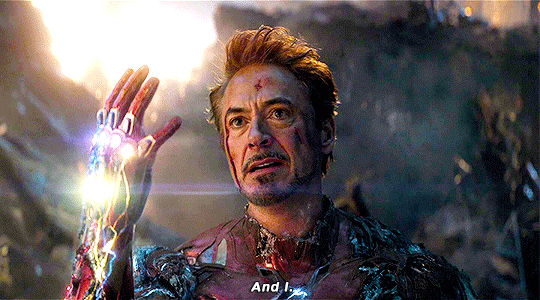
3. Annabelle Comes Home
I am a whore for scary movies. I love them so much and this one was *chefs kiss*. I love Mckenna Grace, she's such a good young actress and she fits so well in scary moves. There’s not much to say about the plot in this one, and ya really need to see it. Also, Bob (Michael Cimino) is so heckin cute what the heck.
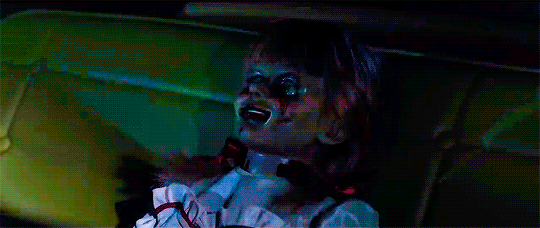
4. Let It Snow
Ok this is a lot to unpack so grab ya snacks. Let’s talk about couple number 1 (of 3), Tobin (Mitchell Hope) and Angie (Kiernan Shipka) who are best friends. Tobin is in love with Angie but doesn’t know how to tell her, and gets lots of unwanted encouragement from his best friend Keon (Jacob Batalon) who just wants to throw a heckin good party, is that too much to ask for? So Angie gets invited to a party by some cute guy, JP (M and Tobin is jealous but goes with her anyways and they steal a keg for Keon’s party and run from the scary hosts of the party and end up stranded in a church after his car spins out of control. They finally make it to the party and kiss on the roof with the waffle town sign shining bright behind them. NEXT - we have Julie (Isabela Merced) and Stuart (Shameik Moore). This is kind of really cliche with the whole “he’s-famous-she-doesn’t-care-he-finds-that-attractive-lets-fall-in-love” aspect, but its also hella cute uwu. They meet on a train and the train stops so they go eat at the waffle town and go sledding and do a bunch of cute coupley shit. His manager comes to get him and basically tells her that nothing will ever really happen between them and he leaves. Then, he shows up at the party and they fall in love. NEXT- we have Dorrie (Liv Hewson) who is a lesbian that constantly struggles with the gay panic. Her best friend Addie (Odeya Rush) doesn't help much either because she's having her own relationship problems. Dorrie works at Waffle Town and when she's working the girl she's talking to, Kerry (Anna Akana) comes in with her dance team, and she's not out of the closet. A bunch of shit goes down, but they end up together and Dorrie learns that she’s worth more than she thinks and that’s all that matters. Also, Billy (Miles Robbins) and Tin Foil Woman (Joan Cusack) make wonderful additions to this movie.
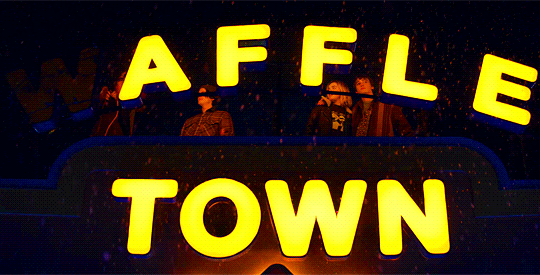
5. The King
First of all - Timothée Chalamet and Robert Pattinson in the same movie? Sign me the HECK up. But they’re also historical, frick yea. Not too much to say about this movie other than it’s good. Super graphic (don’t watch if you don’t like decapitation lol) and super long, but good nonetheless.
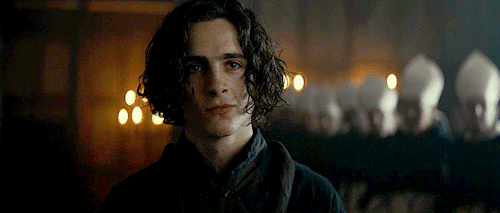
6. Falling Inn Love
This movie is super freaking cute. Gabriela (Christina Milian) decides that she needs a change and enters a contest to win an Inn in New Zealand. She wins the Inn and is shocked when she realizes the Inn needs a LOT of work. She goes around town to get stuff to fix up the Inn and constantly runs into Jake (Adam Demos) and they have this flirty but we don’t like each other relationship, but then ya know, they fall in(n) love.
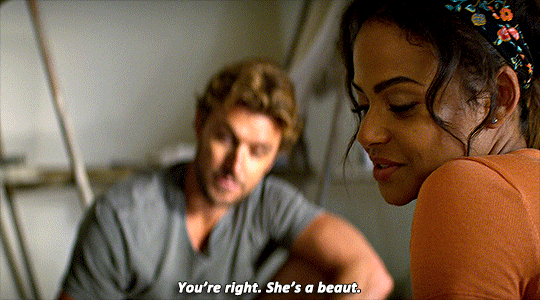
SHOWS -
1. The Society
I could talk about this show for hours, literally. I love it so much it’s insane. Ok, so lets start from the beginning. A town called West Ham is being plagued by a disgusting smell. Due to this, the town decides to send busloads of teenagers to the mountains while they try and resolve the smell situation. All of the teenagers fall asleep on the bus and wake up to the announcement that they had to go back home due to road blocks. When they get off the buses, its late and no one is there to pick them up. They think that it may just be a sense of miscommunication, so they head home, only to find that none of their families are there, and they can’t get ahold of any of them over the phone. They finally decide to investigate and find that all exits out of town are completely blocked off. They then decide to find a way to survive without their families. This causes a lot of tension within the town including the death of a main character. This shows also includes gay representation!!!! This is my favorite couple, Sam (Sean Birdy) and Grizz (Jack Mulhern). Sam is deaf and gay and his brother, Campbell (Toby Wallace), makes fun of him for both reasons, and when the whole issue with the town happens, he believes he will never find love because he doesn’t think anyone else is gay, until Grizz comes along, and tries to learn ASL and loves him for him.
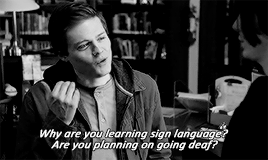
2. Roswell New Mexico
Alright, to be completely honest, I did not want to watch this. I have no idea why I just didn’t. I saw an edit on like instagram or something of the couples in the show and I was like, alright I can give it a chance. And spoiler alert I loved it. The series starts off with Liz Ortecho (Jeanine Mason) comes back to her hometown of Roswell around the time of her the anniversary of her sister, Rosa’s (Amber Midthunder), death. She gets pulled over on her way in and the officer that pulled her over was Max Evans (Nathan Parsons), who has had a crush on her since they first met, and just so happens to be an alien. After Liz gets shot in her families restaurant, Max uses his healing powers to save her, but leaves behind a hand print on her that makes her suspicious. She continues to investigate until he tells her the truth. She also finds out that her sister was actually murdered, and has the same hand print on her that she did when Max healed her. Turns out, his sister, Isobel (Lily Cowels) killed her, but it was actually another alien possessing her (which they didn’t know was possible when she killed her). When they landed on earth they also landed with their “brother” Michael (Michael Vlamis) who starts off the series with an on and off relationship with Alex (Tyler Blackburn) and I love them together. Alex is the son of one of the guys trying to find and take down the aliens and he also went to war and lost his leg. Anyways, towards the end of the season Alex starts seeing Maria (Heather Hemmens), which is a couple I don’t really like, but also bi representation is good! Anyways I don’t really wanna spoil this one too much I just love it a lot.
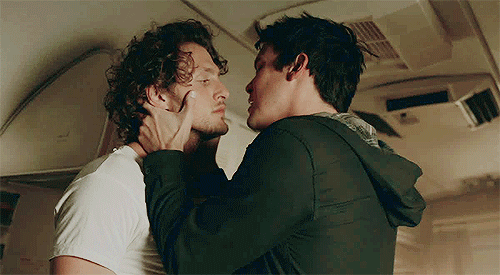
3. Elite
This is a show that came out in 2018, but they released a second season this year. All I’m saying is please watch the original version, not the dubbed over version. Elite is a spanish show about a few students that get a scholarship to the private school after their school gets demolished. This shows is in the fashion of present and past which includes a lot of flashbacks leading up to the the murder of one of the students. My favorite part of this show is the relationship between Ander (Arón Piper) and Omar (Omar Ayuso). Ander is the son of the head of the school and Omar is the brother of one of the students that got a scholarship. Not only are they of different socioeconomic status’, but Omar is also Muslim, and his family would not approve of him being gay. He finally finds the courage to tell his family, but thats not until season 2. Also, his sister Nadia (Mina El Hammani) falls in love with the “bad boy” of the school, Guzmán (Miguel Bernardeau) and starts going against her parents wishes as well.

4. The Umbrella Academy
Y’all mind if I confuse y'all real quick. So, a bunch of women all of the sudden give birth out of nowhere at the same time even tho none of them were pregnant? Yea I know weird. Anyways, so this dude tries to adopt as many of them as possible and ends up adopting like 7. They all have powers and they try and stop the apocalypse. That’s literally all I can tell y'all.
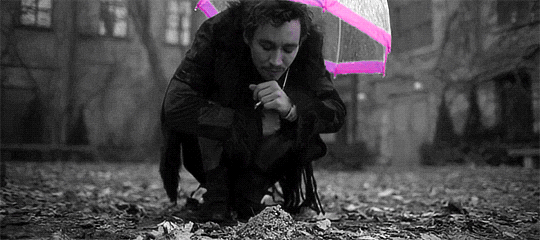
5. Unbelievable
I swear I didn’t mean to get y’all upset right now. This show made me angry and sad and so many other feelings all at once. So the show beings with a girl named Marie (Kaitlyn Dever) getting raped in her home. When she reports it, they can’t find any evidence, as he cleaned the apartment and made her shower. This mixed with the fact that she struggles remembering parts of her experience (which is common with sexual assault), the police don’t believe her and force her to retract her statement. This in itself is awful, but they also charge her with false statement, which adds on to the fact that people already believe that she is a liar. Years later, two female detectives, Karen and Grace, piece together rapes in their precincts and once they find the rapist, they find Marie’s picture in with his belongings, proving that she was telling the truth the entire time.
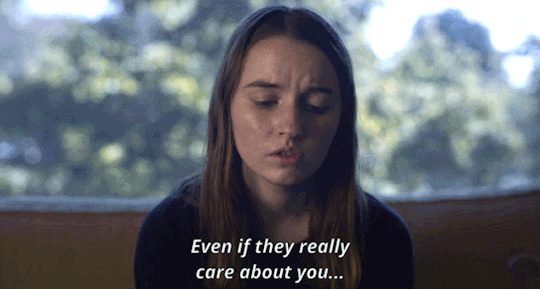
6. Sailor Moon
I just got into anime and all I have to say is that I love this. That is all.
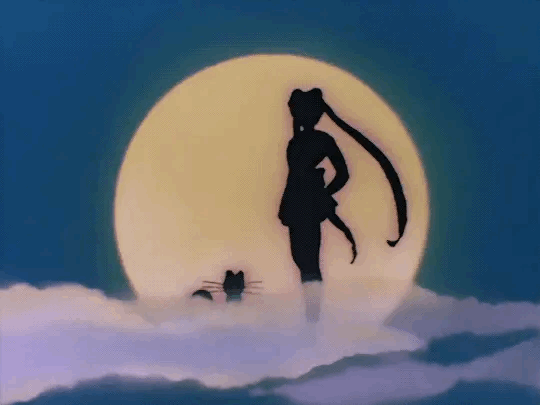
#after#avengers: endgame#annabelle comes home#let it snow#the king#falling inn love#the society#roswell new mexico#elite#the umbrella academy#unbelievable#sailor moon#hardin scott#tessa young#harry styles#captain america#tony stark#steve rogers#iron man#annabelle#timothee chalamet#robert pattinson#grizzam#grizz and sam#alex and michael#malex#max and liz#ander and omar#usagi tsukino#movies
68 notes
·
View notes
Text
THE UMBRELLA ACADEMY OC MASTERLIST

Real Name: Joy Elaine Hargreeves
Aliases: Number 10, The Changeling
Faceclaim: Lili Reinhart
Age: 22
Species: Human
Powers: Glamouring, Shapeshifting
Status: Alive
Slight Summary: Joy was one of the 43 miracle babies born in 1989. She was dubbed Number 10 by her adoptive father Reginald Hargreeves. Always eager to please, Joy tried her best to do good in Reginald’s eyes but all of her efforts were for nothing. Her powers simply weren’t developing right, so Reginald tossed her aside along with other Three J’s. He would let Five experiment on Joy, Jill and Jinx. The Three J’s resented Five and would grow to hate him even more after he accidentally sent them back in time. Joy spent years stuck in the ‘60s until she was whisked back into her time, two years after Jinx and Jill. Suddenly, Joy is the baby of the family, her older siblings close to moving out of the house. Joy spent her days trying to perfect her power and secretly taking up dancing. Her adoptive mother Grace and the family’s butler Pogo loved to watch her do little routines. Joy grew to resent her father much like her siblings. After their brother Ben dies, the family is in shambles. All of her siblings move out or run away from home, leaving Joy behind to pick up the pieces. She meets local boy Aiden Calloway and the two start a relationship. That would eventually lead to her getting pregnant. Reginald tries to take her son from to conduct further experiments and find out whether or not he also has powers. Joy nips that in the bud and runs away from home at last. She lives with Aiden until their son dies in a tragic accident. Joy pulls away from Aiden, Jill and Jinx and decides that she won’t accept her sons death. She gets in touch with local warlock Rudolph Easton in hopes of finding a way to get her son back. Then, her father dies and Joy goes back for the funeral. Already enough of a bad day, suddenly her brother Five comes back from the future with troubling news.
Story: Free Falling

Real Name: Jillian Scarlet Hargreeves
Aliases: Number 9, The Empath
Faceclaim: Sarah Jeffery
Age: 23
Species: Human
Powers: Empathy, Resurrection
Status: Alive
Slight Summary: Jill was another one of the 43 miracle babies born in 1989. She was dubbed Number 9 by her adoptive father Reginald Hargreeves. Jill hated her father with a passion. In fact, she hated most of her family except for Jinx, Ben, Joy and Diego. She also had a soft side for Grace and Pogo. Jill was a rather blunt person. Her powers were mostly considered useless, so she was relegated to being Five’s lab rat. When he sent her back in time, she ended up spending a few years in the ‘50s all by herself at age twelve. She came back to the real world a year after Jinx. Both of them had returned as infants. Joy joined them a year later. Luckily, Reginald managed to speed up the Three J’s aging process, putting her at only seven years younger than her older siblings. She hated growing up as a Superhero, so she was more than glad to run away from home and start her own life. Unfortunately, College did not work out as she had hoped, so instead she took up a job delivering pizza and moved in with Diego in the back of the boxing studio. When she gets news of her fathers death, Jill can’t help but feel relieved. After the things she did to her and her siblings, especially Joy, she can’t bring herself to feel saddened. She opts out of going to the funeral but Jinx drags her along anyways. At the funeral, Five appears back at the house and brings catastrophical news with him.
Story: Free Falling

Real Name: Jinx Oscar Hargreeves
Aliases: Number 8, The Inferno
Faceclaim: Lamar Johnson
Age: 24
Species: Human
Powers: Fire Generating
Status: Alive
Slight Summary: Jinx was another one of the 43 miracle babies born in 1989. He was dubbed Number 8 by his adoptive father Reginald Hargreeves. As a child, Jinx’s powers were severly underdeveloped. Instead of helping him get control of his powers, Reginald shunned his son and let Five conduct experiments on him. Five accidentally sends Jinx to the ‘70s. Alone and afraid, Jinx had to learn how to survive on his own rather quick. He is the first to be sent back to his time and the first to be brought up closer to his by now older siblings’ age. Growing up, Ben and Jill were Jinx’s best friends. When Ben dies, Jinx has enough and flees from home. He goes to College, deciding that instead of trying to be the kind of Superhero that fights bad guys for his father, he wants to be another kind of Superhero. He studies to become a social worker and keeps steady contact with Jill. When he hears of his fathers passing, he isn’t saddened though he still goes to the funeral to pay his respects. But after going back home and hearing the news his brother Five springs on the family, he’d wish he’d have stayed away.
Story: Free Falling

Real Name: Aiden Gilbert Calloway
Aliases: The Fang
Faceclaim: Alberto Rosende
Age: 22
Species: Vampire
Powers: Super Strength, Immortality, the ability to be out in daylight
Status: Undead
Slight Summary: Aiden was born in The City. He has two loving and rich parents and an older sister. He grew up to become a quirky and tech-loving teen. While working as videoprapher for a party, he meets Joy Hargreeves. The two fall in love and soon enough Joy is pregnant. Aiden is overjoyed with the news and gladly houses Joy and their son Cooper after she escaped her home. When Cooper dies in an accident, Joy pulls away from Aiden. To escpae the situation and somehow come to terms with his son’s passing, Aiden buys a van and travels across America, giving Joy the space she needed. He comes home after finding out from Klaus that Joy is willing to ruin her life in order to bring their son back from the dead. Suddenly caught in the crossfire, Aiden dies. Joy is heartbroken and begs Rudolph to somehow reverse the damage. Rudolph refuses her, feeling like he had already caused enough damage. But his assistant Valentino has a plan. Aiden is turned into a Vampire and must now learn to deal with his new life.
Story: Free Falling

Real Name: Rudolph Emmanuel Easton
Aliases: The Warlock
Faceclaim: Harry Shum Jr.
Age: Undetermined (Centuries Old)
Species: Warlock
Powers: Fire Generating, Ressurection, many spells from his Book
Status: Alive
Slight Summary: Rudolph was born in the 1700′s to his Warlock mother and father. Both of them were reverred in their field. They were killed in the 1920′s, leavin Rudolph to take up the mantle. He eventually recruited his best friend Valentino to be his assistant. Rudolph is an all-around gentle soul and offers his magical services to everyone who needed it. He innitially turned Joy away, too afraid to dabble with any more ressurrections. Though, she eventually won him over and he attempted a ritual. It backfired and instead Joy’s boyfriend Aiden dies. Rudolph is sent into a tailspin. He retreats back into his condo and refuses Joy’s offer to try and bring Aiden back, horrified with what he had done. Upon learning that Valentino had gone behind his back and brought Aiden to a Vampire, the two have a fall-out. They mend their relationship as they try to look for a way to stop Vanya Hargreeves from destroying the planet.
Story: Free Falling

Real Name: Winter Louise Lowery
Aliases: Lacy Lovelace, Heather Jones, The Ice Queen
Faceclaim: Victoria Pedretti
Age: 30
Species: Human
Powers: Cold Manipulation
Status: Alive
Slight Summary: Winter was another one of the 43 miracle babies. Though, unlike the ten heroes of our story, Reginald Hargreeves never got his hands on her. She grew up with her loving parents and two siblings. Jane and Martin Lowery didn’t plan on having Winter but they accepted her as their miracle nonetheless. Winter grew up trying to suppress her powers but eventually she couldn’t do it anymore. Martin called Reginald to see if he could help but when Reginald wanted to buy Winter rather than help her, he threw him out and never contacted him again. Winter wasn’t very booksmart and didn’t make it into College. But she didn’t want to live at home and bother her parents anymore either. So after many attempts at finding a job, she turned to a stripper locale far from her parents home. She took on the stage name Lacy Lovelace and did her thing for a while. Through her job, she met her future husband Jeffrey. Winter didn’t want her parents to know what she did for a living, so instead she called herself Heather Smith and eloped with Jeffrey, never telling her parents about it. While not physically abusive, Jeffrey was emotionally and mentally abusive. In the end, Jinx would convice Winter to leave him. She returned home, head down low. Her father offered her a job at his P.I. firm, where he worked with Winter’s older sister, Brittany and her younger brother, Elliott. She starts working there as a secretary.
Story: TBA

Real Name: Samuel Henry Carter
Aliases: -
Faceclaim: Denny Love
Age: 31
Species: Human
Powers: None
Status: Alive
Slight Summary: Sam was born in The City, a year before his brother Jinx. Sam and Jinx’s mother never told Sam about her second son. Sam grew up with his mother and eventually started going to a boarding school where he met his future best friend Kyle Mori and Riverdale resident Rain Ortiz. Rain would only be with the boys for a year but they never forgot her. Sam gets into film and moves away from The City to go to film school. At age 31, he returns home to work on a project with Kyle. There, he finally meets his brother Jinx.
Story: TBA

Real Name: Kyle Theodore Mori (neé Doiley)
Aliases: -
Faceclaim: Jay Lee
Age: 29
Species: Human
Powers: None
Status: Alive
Slight Summary: Kyle was born in Riverdale to his father Darryl Doiley and an unknown woman. He is Dilton Doiley’s half brother and was given up for adoption long before Dilton was even born. He was taken in and raised by a lovely couple in New York City. He started going to a boarding school where he met Sam Carter and Rain Ortiz. After school he goes to College and majors in History. He starts working as a History teacher and eventually comes to The City with Sam to help him work on a project.
Story: TBA
TAGGING: @hughstheforcelou
#the umbrella academy#ocappreciation#tua original character#tua fanfiction#oc: joy hargreeves#oc: jill hargreeves#oc: jinx hargreeves#oc: aiden calloway#oc: winter lowery#oc: sam carter#oc: kyle mori
11 notes
·
View notes
Link
Twelve years ago today, UPN (RIP!) premiered a cult-classic neo-noir about murder, class warfare, sexual assault, and forbidden love. It was quippy and campy and smart as hell—and it just happened to center on a pint-sized blonde who looked like a cheerleader but thought like Sherlock Holmes. The show was Veronica Mars, and even if the last decade has muddled its legacy with a much-hyped but ultimately disappointing fan-funded follow-up film and, of course, the extremely meh third season, the high school years remain an unparalleled success. Veronica Mars seasons one and two were better than anything that had come before, far surpassed its competition in quality, and set a high bar for future shows that has only barely been met by a few episodes of television here and there. So give my regards to Friday Night Lights (a family show, not a teen show) and Degrassi (please), but Veronica Mars is the best teen show of all time*.
1. Nuanced Class Conflict
Gossip Girl and The OC did it well, but Veronica Mars did it better. Even though Neptune, CA, is technically fictional, it's as real a place as has ever been portrayed on television. Its particular problems and reputation informed everything from law enforcement (the question of whether or not to incorporate the town into a city and make the sheriff's office into a police department) to the biker gangs riding through on their way up and down the PCH. The levels of privilege/lack thereof were so nuanced and specific. Other shows divide people into the Haves and the Have Nots; on Veronica Mars, everyone has something a little different. At the bottom of the socioeconomic ladder is Weevil, whose background is not only impoverished but criminal; the only community he can "afford" is a gang (though his crew isn't all bad—you'll find nary a broad stroke or generalization in the world of Veronica Mars). In the center of things are Veronica and Keith, who lived comfortably when Keith was sheriff, but have buckled their belts since he became a private eye. On the one hand, they own a small business! On the other, they live in a pretty crap apartment complex and have nowhere near enough saved to send Veronica to college. Then there's the nouveau-riche Echolls', who have all the glamorous trappings of wealth (cars, booze, mansion) and pretty much none of the cultural capital. At the top of the heap are the Kanes; while the Echolls' have enough money to "get away" with murder, the Kanes have enough money to get away with it, cover it up, frame someone else for it, and get the sheriff fired for looking into it. Money problems are basically the least-juicy of TV plots, but by using wealth disparity as a way to develop the characters, essentially building it into the DNA of the show, Veronica Mars created a TV universe just as interesting and complicated as that of Friday Night Lights or Parks and Recreation.
2. Lianne Mars
A girl with a missing mom is a fairy tale trope as old as time, rooted in a deification-of-the-female version of misogyny that I don't have time to get into right now. Suffice it to say, a dead or absentee mother is usually a sign of lazy writing. It's a way to reduce the character count and set a heroine adrift while, not coincidentally, making it so the (usually male) writer doesn't have to think of what a grown woman would think or talk or act like. At first, this is the fate of Veronica's mother, Lianne Mars. She was just conveniently...gone, another casualty of the fallout from the Lilly Kane murder investigation. Her absence lets Veronica be angsty and ill-supervised even as Keith Mars entered the canon of Bestest TV Dads of All Time (which he is! Love Keith forever and ever). But then she came back, with baggage, and the trope was, if not redeemed, at least put to good use. Lianne is an alcoholic who couldn't deal with the disappointing turns life took, and she finally cracked when her husband ran directly into conflict with her lost love Jake Kane, for whom she still pined. Even when she decides she wants to be a mom again, she can't quit being an alcoholic. And as heartbreaking as it is to watch Veronica play the parent, it's also a moment of growth. Veronica realizes—or rather, decides—that she isn't doomed to repeat her mother's mistakes. She is a stronger, better person than Lianne. A person big enough to love her flawed mother, even strong enough to forgive her. In the third episode, Veronica says, "The hero is the one that stays, and the villain is the one that splits." By the end of the series, Veronica has learned what true villainy looks like, and it ain't her mom. Showrunners, take note: This is how you do a realistic redemption story.
3. The Guest Stars and Bit Players
The casting department at Veronica Mars did flawless work. Obviously, the core cast is great, but the semi-regulars and guests are also amazing. There's an entire season devoted to Steve fucking Guttenberg. Lisa Rinna and Harry Hamlin play the negaverse versions of themselves. Ryan Hansen and Ken Marino do their Ryan Hansen/Ken Marino Shtick, and why shouldn't they? Max Greenfield (a.k.a. Schmidt on New Girl) and Tessa Thompson (from Dear White People and Creed) both had recurring roles long before they were famous, and even Tina Majorino (Mac) and Michael Muhney (Lamb), who didn't really "break out" in a major way after the show, are perfect in their roles. The second (SECOND) IMDb credit for one Jessica Chastain is an episode of Veronica Mars, and of course, Leighton Meester appears in two episodes. Yes, there are other teen shows that feature young actors who went on to bigger, better things, but I maintain that Veronica Mars is notable for encouraging real actors to do real work.
4. The Mysteries Were Smart AF
The show trusted its audience to keep up and pay attention. Maybe even a little too much. In the era before binge-watching and old episodes being able on demand, Veronica Mars suffered from the same issue that plagues the first few seasons of The X Files: Viewers who weren't "caught up" on the season-long mystery arc found it difficult to get into. VM had low ratings throughout its run, and when it used the shift from high school to college to introduce shorter, quicker mysteries, well, we all know how season three went. But looking back, it's clear that the show was ahead of its time, telling smart, twist-y weekly stories while teasing out a longer mystery that deeply impacted the main characters' lives. (Can't you just imagine how they'd advertise the show now? Moody teaser trailers with the tag line "Who Killed Lilly Kane?" and fansites and podcasts devoted to all the clues and hints and easter eggs from every episode?) There are other teen mystery/crime-fighter shows, sure, but they tend to put their characters in immediate peril, which makes the audience ask, "What's going to happen?" Instead, Veronica Mars is an intellectual exercise, evidence and theory based, and the question becomes, "What has already happened, and what does it mean?" That's the kind of meaty writing that inspires, if not legions of fans, a loyal audience to sing its praises. Veronica Mars was so smart it was niche. I'm not making a case for VM as overlooked prestige television, but then again I totally am. WHY didn't it win any Emmys?
5. They Didn't Explain Every Little Thing
See: above "trusting the audience smartness" factor. They didn't explain why sleeping with a "consenting" teenager is still wrong, or why Logan and Veronica went from adversaries to lovers in the space of like, a week, or why money equals power. They got that the audience got it. So, the exact opposite of a show like, say, Secret Life of the American Teenager. There were episodes that touched on privilege and entitlement and infidelity and the abuse of power by law enforcement, but it was subtle and real instead of, you know...Degrassi.
6. The Humor
It wasn't dark and humorous, it was darkly humorous and humorously dark. (Think combining the creepy weirdness of Twin Peaks with the banter of Moonlighting.) Logan's poignant answering machine messages, Veronica's epic takedowns, even Lamb got to be withering and snarky while he systematically fucked over the whole town.The humor kept us invested even when stories dipped into sentimental, Dawson's Creek-esque territory and deflected the romance-y moments that might have turned it into a mystery-style Felicity. Veronica's and Logan's jokes, in particular, also serve a psychological purpose: mask their pain at any cost. Unlike in Gilmore Girls, where every character speaks like a hyper-intelligent stand-up comic and not at all like a teenager or real human being, Veronica and the residents of Neptune make comments that feel true to their characters and relevant to their circumstances. If you watched any episode of Scream Queens and thought, "I guess they're trying to imitate...Scream? Heathers? Clueless? With the smart/bitchy blondes and the snappy comebacks and the eye rolls?" I understand. But actually, they were trying (and failing. Hard.) to do Veronica Mars. Smart sassy cute mean heart of gold flirty clever repartee? Yeah, that's Veronica Mars, and Ryan Murphy, bless his soul, is not Rob Thomas.
7. The Rape Plot(s)
From the very first episode when, in a flashback, golden-haired, white dress-clad Veronica walks, almost in a stupor (have you ever seen a more "perfect" victim?) into the sheriff's office to tell Lamb that she was raped—because she is a good girl and good girls go to the authorities—only to have him, basically, shrug it off, rape and sexual assault were core themes of the show, central to its purpose and story engine. Creator Rob Thomas initially envisioned the story as a YA novel with a male protagonist, and changing the lead's gender to female is arguably the best and most important decision he ever made. Veronica's sexuality is everything. How she flirts her way out of scrapes, plays innocent when it can help her, distrusts it when she's attracted to the "wrong" person, is allowed to enjoy it with Logan and, of course, how her virginity was taken from her one night she can't quite remember. The show takes Veronica's rape seriously as not just a plot point or easy motivation, but as a defining part of her character. She cleans obsessively and looks over her shoulder. She's sensitive to the potential aggressors—and victims—at her school. She knows that her rapist was someone she knew, and she has to live with that mystery every day. But it's complicated. That night she can't remember might have been semi-consensual, but then we learn, no it wasn't. Yes, there's a story about a false rape accusation (against Adam Scott!), but the truth only makes the situation murkier. And in an unfortunately rare move, Veronica Mars also depicts the aftermath of the sexual abuse of boys, including an exploration of how the stigma against male assault survivors re-traumatizes them. (The third season is, in my opinion, a missed opportunity to tackle the campus rape epidemic. By blaming the rapes on a psychological experiment gone awry, the show unfortunately ignores the fact that toxic masculinity isn't a role-playing aberration but a pervasive national issue. But its heart is in the right place, if not its logic.)
8. Veronica
Choker-wearing, dog-owning, private-detectiving blonde badass Veronica Mars. She's most often compared to Buffy, that other crime-fighting cutie with a ragtag army of friends and a ne'er do well love interest, and the comparison is apt. Both possess skills their peers do not and use those skills to solve problems both thrust upon them and sought. But the difference is that in the space that Buffy uses to explore the supernatural, Veronica Mars plays with loyalty and ethics. Is it wrong to snitch on your friends? Is a rumor evidence? Can you break the law to serve a higher good? These are issues Buffy doesn't wrestle with; it's pretty much a given that evil vampires are worth defeating (yes, there are definitely instances when Buffy is tested because she's fallen for a vamp or one of her friends is possessed or whatever, but that's not like, the thing of the show). And while so many other "outsider/observer/new kid" teen show protagonists (Ryan, Dan, Dawson, Lindsay Weir) long to get "in," Veronica's been there. She's been popular, and (a little) wealthy. She's not exploring a new world, she's re-learning her old one. In that she has more in common with Angela Chase, but way less whiny. You watch My So-Called Life and think, I'm totally Angela. You watch VMand think, I wish I were Veronica. When people talk about the strong but vulnerable but smart but flawed but cool but real but beautiful but relatable but empowered but conflicted but modern but iconic but a good role model but not unattainable with a job not defined by that job "interesting" female characters on television, a few names tend to come up again and again: Carrie, Murphy, Ally, Roseanne, Olivia, Dana. To that (very white!) pantheon I humbly submit: Veronica.
*....except for Freaks and Geeks.
22 notes
·
View notes
Text
HARD Summer Music Festival- August 5-6, 2017
HARD Summer Music Festival (HSMF) will be celebrating its 10th anniversary this summer. HSMF will bring thousands together to celebrate the end of festival season at The Speedway in Fontana, Southern California on August 5-6. Boasting an amazing lineup and many new surprises, you know HARD will be bringing the heat for it’s 10 edition.
The Lineup
HSMF has a history of bringing huge names to the August festival, and the 10th annual event is no exception. The lineup features some of the most sought after electronic music acts, as well as some of the hottest rap artists in the game. Headlining this year is DJ Snake, Justice, Rae Sremmurd, Zeds Dead, Snoop Dogg, Dog Blood, Bassnectar, and Migos! In addition to this years headliners, I am looking forward to sets from Doctor P, Vincent, Jai Wolf, What So Not, Baauer, Brillz, Ekali, and Lookas.
This years lineup also features more female talent than any past lineup, including vocalists and rappers Charli XCX, Tinashe, Uffie and Tink, as well as producers and DJs Anna Lunoe, Nina Las Vegas, JPhlip, Kim Ann Foxman, Ellen Allien, Gina Turner, Nancy Whang, Masha, Sita Abellan, Heather b2b Collette, Louisahh, Kittens, J Worra, Uniiqu3, Cray, Jubilee, GG Magree, Qrion, Whipped Cream, and Deux Twins.
Saturday, August 5
DJ Snake / Justice DJ Set / Rae Sremmurd / Zeds Dead Tchami / Cashmere Cat / Skepta / Ty Dolla $ign / Malaa / A-Trak / Mobb Deep / Yehme2 / Doctor P / Anna Lunoe / Kayzo / E-40 / Brodinski / Charli XCX / Mercer / Busy P / AC Slater / Nina Las Vegas / Wax Motif / Soul Clap / Ellen Allien / Wiwek / Chris Lake / Chris Lorenzo / Amine Edge & Dance / Drezo / Mustdie! / Saymyname / Problem / Uffie / Egyptian Lover / Ghetts / Gina Turner / Nick Monaco / Vincent / Uncle Jxmi / Dj Heather B2B Collette / Doc Martin / Sita Abellan / Oshi / Josh Pan / Mad Zach / GG Magree / Cray / Jubilee / Oski / Qrion / Phlegmatic Dogs / Nukid / Masha / Whipped Cream
Sunday, August 6
Snoop Dogg Performing Doggystyle / Dog Blood / Bassnectar / Migos Jai Wolf / Snakehips / Claude Vonstroke / What So Not / Baauer / Kill The Noise / JME / Mike Will Made It / Destructo / 12th Planet / Tinashe / Madeintyo / Brillz / Party Favor / Shiba San / MK / Ekali / Giraffage / Jackmaster / Jimmy Edga / J. Phlip / Floating Points (DJ Set) / Motez Kim Ann Foxman / Whethan / Thugfucker / Kap G / LA Leakers / Graves / 4B / 24HRS / Dave / AJ Tracey / London On Da Track / Nancy Whang / Louisahhh / Tink / Walker & Royce / Hotel Garuda / Christian Martin / Madam X / Kittens / J. Worra / Lookas / Uniiqu3 Volac / Brohug / LDRU / Colby J / Deux Twins
HARD Drops 2017 Trailer – GRL PWR
Last year’s HARD SUMMER music festival only featured five female performers. This year’s edition–set for August 5 & 6 in Southern California–features 25. Today (May 2), HARD Events has released its annual trailer which takes a satirical, consciousness-raising, pro-women look at how supergroup GRL PWR gets on the bill. It’s DJ Snake, Claude VonStroke, What So Not, Party Favor and Kayzo as never seen before.
Super sleaze agent Harvey says to his clients–“Sex sells, not music!”–as he adjusts their anatomy to fit HARD‘s founder and festival mastermind Gary Richards’ request for more female talent. Longtime collaborator director Agata Alexander-who has entertained HARD fans with her smart, edgy video concepts (including pairing HARD performers as canines and putting together the legendary ‘Strawberry Gang‘) leaps into the timely discussion of how women are perceived in entertainment. The piece culminates with epic festival footage set to Cray’s “Infinity Signs”. View the 2017 Trailer Below:
Director Agata Alexander shares her thoughts on putting together this year’s HARD SUMMER trailer:
“There was no way I could do a trailer for this years’ HARD SUMMER without touching on something meaningful.
I spoke to Gary (Richards) about getting more females on the lineup. He, his team at HARD and I started to put together lists of women we could get for the show but it felt so predictable– a token gesture to have one or two big female headliners. Why did we have such a hard time figuring out who to get other than that? Why were all the new artists being pushed onto Gary from different managements men? Gary started digging deeper and I really respect him for this. He called me and was like ‘Yo, I’m finding so many dope chicks I’ve never even heard of. This is so cool.’ So that became our purpose. Giving the female underdogs a chance which brought us Madam X, Kittens, GG Magree, Cray, Jubilee, J.Worra, Uniqqu3 and others.
I decided that I wanted powerful male artists to do something crazy to make a point. It’s important for men to step forward and support women as loud as they can. We need that. Whenever a female voices her opinion about stuff like this, everyone points at her and says ‘she is a bit too much, perhaps one of those ‘crazy feminists… definitely not getting laid.’ I didn’t want to expose the female artists to this type of stuff in comment sections. I figured let’s turn the table and put the men through the ringer. It catches your attention as the absurdity of the situation becomes more clear and it’s important that the fans of these men look at the video and hopefully understand what’s wrong with our world.
Why did I put boobs on them? Cause tits automatically make you a sexualized commodity in this world and I found it humorous that the manager in the video felt that boobs is enough and all you really need. I respect these guys so much for being in this video and going all out. They showed up to that set without a complaint in support of women. In the end of the day it’s just boobs, everyone loves ’em, many of us have ’em. What’s the big fuss?”
Adds Anna Lunoe, who makes a cameo as a video director:
“Talking about being a woman in the electronic space in any capacity is tricky, multifaceted, tiresome and after so many years I just prefer to avoid the topic and get on with the job! I have known Agata for a few years now and she has a way of portraying things with the right amount of comedy, creativity and I trusted that she would get it right. If anyone understands the plight of being a minority in their industry its her. I’m a big believer in referencing to the absurdity of society in comedy and that itself being a great catalyst for cultural awareness & change – also, her script was just very funny even on paper!”
Kittens
Ticket Information
2-Day General Admission Passes- $129 Single Day GA Passes- $89 2 Day VIP- $309 // Single Day VIP- $159
VIP Tickets includes:
Exclusive Fast-Track Entry into the Festival (Skip GA Line) Exclusive Hospitality areas adjacent to multiple stages with expanded bar options, upgraded semi-exclusive restrooms, plush couches, and direct views of performances
Purchase your HARD Summer Tickets Here
About HARD Summer Fest
The very first HARD on New Year’s Eve in 2007 featured Justice, 2 Live Crew, Steve Aoki and Peaches and its eclecticism would in many ways shape the festival’s diversity to this day. The HARD stage has played host to everyone from Ice Cube, The Weeknd, A$AP Mob, Pharrell and Future to Giorgio Moroder, Die Antwoord and The Chemical Brothers. Moreover, the brand has continually evolved. HARD has delivered an unforgettable experience to millions of music fans over the years and augmented the mainstream rise of many leaders in the electronic music genre including deadmau5, Calvin Harris, Skrillex, Justice and many more.
An easy drive from downtown Los Angeles, The Speedway in Fontana boasts an expanded foot print reaching over 500 acres and convenient parking. Enhancements to this year’s festival experience include more shaded areas, doubling entry and exit points, expanded camping and increased mobility overall around the festival grounds. Stay tuned for more details.
#gallery-0-5 { margin: auto; } #gallery-0-5 .gallery-item { float: left; margin-top: 10px; text-align: center; width: 33%; } #gallery-0-5 img { border: 2px solid #cfcfcf; } #gallery-0-5 .gallery-caption { margin-left: 0; } /* see gallery_shortcode() in wp-includes/media.php */
Photos by Alive Coverage
Website / Facebook / Twitter / Youtube / Soundcloud
HARD Summer Music Festival The Speedway in Fontana, Southern California August 5-6, 2017
Rashae- FestPop Staff Writer
HARD Summer Music Festival Returns for 10th Annual Event August 5-6, 2017 HARD Summer Music Festival- August 5-6, 2017 HARD Summer Music Festival (HSMF) will be celebrating its 10th anniversary this summer.
0 notes
Link
* * * *
LETTERS FROM AN AMERICAN
December 30, 2020
Heather Cox Richardson
And so, we are at the end of a year that has brought a presidential impeachment trial, a deadly pandemic that has killed more than 338,000 of us, a huge social movement for racial justice, a presidential election, and a president who has refused to accept the results of that election and is now trying to split his own political party.
It’s been quite a year.
But I had a chance to talk with history podcaster Bob Crawford of the Avett Brothers yesterday, and he asked a more interesting question. He pointed out that we are now twenty years into this century, and asked what I thought were the key changes of those twenty years. I chewed on this question for awhile and also asked readers what they thought. Pulling everything together, here is where I’ve come out.
In America, the twenty years since 2000 have seen the end game of the Reagan Revolution, begun in 1980.
In that era, political leaders on the right turned against the principles that had guided the country since the 1930s, when Democratic President Franklin Delano Roosevelt guided the nation out of the Great Depression by using the government to stabilize the economy. During the Depression and World War Two, Americans of all parties had come to believe the government had a role to play in regulating the economy, providing a basic social safety net and promoting infrastructure.
But reactionary businessmen hated regulations and the taxes that leveled the playing field between employers and workers. They called for a return to the pro-business government of the 1920s, but got no traction until the 1954 Brown v. Board of Education decision, when the Supreme Court, under the former Republican governor of California, Earl Warren, unanimously declared racial segregation unconstitutional. That decision, and others that promoted civil rights, enabled opponents of the New Deal government to attract supporters by insisting that the country’s postwar government was simply redistributing tax dollars from hardworking white men to people of color.
That argument echoed the political language of the Reconstruction years, when white southerners insisted that federal efforts to enable formerly enslaved men to participate in the economy on terms equal to white men were simply a redistribution of wealth, because the agents and policies required to achieve equality would cost tax dollars and, after the Civil War, most people with property were white. This, they insisted, was “socialism.”
To oppose the socialism they insisted was taking over the East, opponents of black rights looked to the American West. They called themselves Movement Conservatives, and they celebrated the cowboy who, in their inaccurate vision, was a hardworking white man who wanted nothing of the government but to be left alone to work out his own future. In this myth, the cowboys lived in a male-dominated world, where women were either wives and mothers or sexual playthings, and people of color were savage or subordinate.
With his cowboy hat and western ranch, Reagan deliberately tapped into this mythology, as well as the racism and sexism in it, when he promised to slash taxes and regulations to free individuals from a grasping government. He promised that cutting taxes and regulations would expand the economy. As wealthy people—the “supply side” of the economy-- regained control of their capital, they would invest in their businesses and provide more jobs. Everyone would make more money.
From the start, though, his economic system didn’t work. Money moved upward, dramatically, and voters began to think the cutting was going too far. To keep control of the government, Movement Conservatives at the end of the twentieth century ramped up their celebration of the individualist white American man, insisting that America was sliding into socialism even as they cut more and more domestic programs, insisting that the people of color and women who wanted the government to address inequities in the country simply wanted “free stuff.” They courted social conservatives and evangelicals, promising to stop the “secularization” they saw as a partner to communism.
After the end of the Fairness Doctrine in 1987, talk radio spread the message that Black and Brown Americans and “feminazis” were trying to usher in socialism. In 1996, that narrative got a television channel that personified the idea of the strong man with subordinate women. The Fox News Channel told a story that reinforced the Movement Conservative narrative daily until it took over the Republican Party entirely.
The idea that people of color and women were trying to undermine society was enough of a rationale to justify keeping them from the vote, especially after Democrats passed the Motor Voter law in 1993, making it easier for poor people to register to vote. In 1997, Florida began the process of purging voter rolls of Black voters.
And so, 2000 came.
In that year, the presidential election came down to the electoral votes in Florida. Democratic candidate Al Gore won the popular vote by more than 540,000 votes over Republican candidate George W. Bush, but Florida would decide the election. During the required recount, Republican political operatives led by Roger Stone descended on the election canvassers in Miami-Dade County to stop the process. It worked, and the Supreme Court upheld the end of the recount. Bush won Florida by 537 votes and, thanks to its electoral votes, became president. Voter suppression was a success, and Republicans would use it, and after 2010, gerrymandering, to keep control of the government even as they lost popular support.
Bush had promised to unite the country, but his installation in the White House gave new power to the ideology of the Movement Conservative leaders of the Reagan Revolution. He inherited a budget surplus from his predecessor Democrat Bill Clinton, but immediately set out to get rid of it by cutting taxes. A balanced budget meant money for regulation and social programs, so it had to go. From his term onward, Republicans would continue to cut taxes even as budgets operated in the red, the debt climbed, and money moved upward.
The themes of Republican dominance and tax cuts were the backdrop of the terrorist attack of September 11, 2001. That attack gave the country’s leaders a sense of mission after the end of the Cold War and, after launching a war in Afghanistan to stop al-Qaeda, they set out to export democracy to Iraq. This had been a goal for Republican leaders since the Clinton administration, in the belief that the United States needed to spread capitalism and democracy in its role as a world leader. The wars in Afghanistan and Iraq strengthened the president and the federal government, creating the powerful Department of Homeland Security, for example, and leading Bush to assert the power of the presidency to interpret laws through signing statements.
The association of the Republican Party with patriotism enabled Republicans in this era to call for increased spending for the military and continued tax cuts, while attacking Democratic calls for domestic programs as wasteful. Increasingly, Republican media personalities derided those who called for such programs as dangerous, or anti-American.
But while Republicans increasingly looked inward to their party as the only real Americans and asserted power internationally, changes in technology were making the world larger. The Internet put the world at our fingertips and enabled researchers to decode the human genome, revolutionizing medical science. Smartphones both made communication easy. Online gaming created communities and empathy. And as many Americans were increasingly embracing rap music and tattoos and LGBTQ rights, as well as recognizing increasing inequality, books were pointing to the dangers of the power concentrating at the top of societies. In 1997, J.K. Rowling began her exploration of the rise of authoritarianism in her wildly popular Harry Potter books, but her series was only the most famous of a number of books in which young people conquered a dystopia created by adults.
In Bush’s second term, his ideology created a perfect storm. His administration's disastrous response to Hurricane Katrina, which killed more than 1,800 people and caused $125 billion in damage in and around New Orleans in 2005, revealed how badly the new economy had treated Black and Brown people, and how badly the destruction of domestic programs had affected our ability to respond to disasters. Computers permitted the overuse of credit default swaps that precipitated the 2008 crash, which then precipitated the housing crisis, as people who had bet on the individualist American dream lost their homes. Meanwhile, the ongoing wars, plagued with financial and moral scandals, made it clear that the Republicans optimistic vision of spreading democracy through military conflict was unrealistic.
In 2008, voters put Black American Barack Obama, a Democrat, into the White House. To Republicans, primed by now to believe that Democrats and Black people were socialists, this was an undermining of the nation itself, and they set out to hamper him. While many Americans saw Obama as the symbol of a new, fairer government with America embracing a multilateral world, reactionaries built a backlash based in racism and sexism. They vocally opposed a federal government they insisted was pushing socialism on hardworking white men, and insisted that America must show its strength by exerting its power unilaterally in the world. Increasingly, the Internet and cell phones enabled people to have their news cater to their worldview, moving Republicans into a world characterized by what a Republican spokesperson would later call "alternative facts."
And so, in 2016, we faced a clash between a relentlessly changing nation and the individualist ideology of the Movement Conservatives who had taken over the Republican Party. By then, that ideology had become openly radical extremism in the hands of Donald Trump, who referred to immigrants as criminals, boasted of sexually assaulting women, and promised to destroy the New Deal government once and for all.
In the 2016 election, the themes of the past 36 years came together. Embracing Movement Conservative individualist ideology taken to an extreme, Trump was eager enough to make sure a Democrat didn't win that, according to American intelligence services, he was willing to accept the help of Russian operatives. They, in turn, influenced the election through the manipulation of new social media, amplified by what had become by then a Republican echo chamber in which Democrats were dangerous socialists and the Democratic candidate, former Secretary of State Hillary Clinton, was a criminal. Thanks to the Supreme Court���s Citizens United decision which permitted corporate money to flow into election campaigns, Trump also had the help of a wave of money from big business; financial institutions spent $2 billion to influence the election. He also had the support of evangelicals, who believed he would finally give them the anti-abortion laws they wanted.
Trump lost the popular vote by almost 3 million votes but, as George W. Bush before him, won in the Electoral College. Once in office, this president set out to destroy the New Deal state, as Movement Conservatives had called for, returning the country to the control of a small group of elite businessmen who, theoretically, would know how to move the country forward best by leveraging private sector networks and innovation. He also set out to put minorities and women back into subordinate positions, recreating a leadership structure that was almost entirely white and male.
As Trump tried to destroy an activist government once and for all, Americans woke up to how close we have come to turning our democracy over to a small group of oligarchs.
In the past four years, the Women’s March on Washington and the MeToo Movement has enabled women to articulate their demand for equality. The travel ban, child separation policy for Latin American refugees, and Trump’s attacks on Muslims, Latin American immigrants, and Chinese immigrants, has sparked a defense of America’s history of immigration. The Black Lives Matter Movement, begun in July 2013 after George Zimmerman was acquitted of murdering teenager Trayvon Martin, has gained power as Black Americans have been murdered at the hands of law enforcement officers and white vigilantes, and as Black Americans have borne witness to those murders with cellphone videos.
The increasing voice of democracy clashed most dramatically with Trump’s ideology in summer 2020 when, with the support of his Attorney General William Barr, Trump used the law enforcement officers of the Executive Branch to attack peaceful protesters in Washington, D.C. and in Portland, Oregon. In June, on the heels of the assault on the protesters at Lafayette Square, military officers from all branches made it clear that they would not support any effort to use them against civilians. They reiterated that they would support the Constitution. The refusal of the military to support a further extension of Trump's power was no small thing.
And now, here we are. Trump lost the 2020 election to Democrat Joe Biden by more than 7 million votes and by an Electoral College split of 306 to 232. Although the result was not close, Trump refuses to acknowledge the loss and is doing all he can to hamper Biden’s assumption of office. Many members of the Republican Party are joining him in his attempt to overturn the election, taking the final, logical step of Movement Conservatism: denying the legitimacy of anyone who does not share their ideology. This is unprecedented. It is a profound attack on our democracy. But it will not succeed.
And in this moment, we have, disastrously, discovered the final answer to whether or not it is a good idea to destroy the activist government that has protected us since 1933. In their zeal for reducing government, the Trump team undercut our ability to respond to a pandemic, and tried to deal with the deadly coronavirus through private enterprise or by ignoring it and calling for people to go back to work in service to the economy, willing to accept huge numbers of dead. They have carried individualism to an extreme, insisting that simple public health measures designed to save lives infringe on their liberty.
The result has been what is on track to be the greatest catastrophe in American history, with more than 338,000 of us dead and the disease continuing to spread like wildfire. It is for this that the Trump administration will be remembered, but it is more than that. It is a fitting end to the attempt to destroy our government of the people, by the people, and for the people.
LETTERS FROM AN AMERICAN
HEATHER COX RICHARDSON
#Letters From An American#Heather Cox Richardson#quotes#poltical#history#election 2020#21st century#corrupt GOP#criminal GOP
3 notes
·
View notes